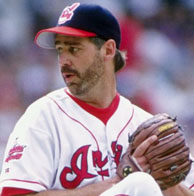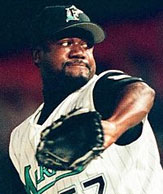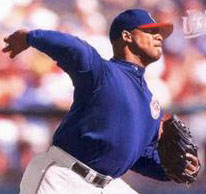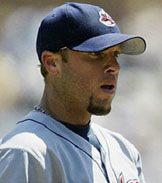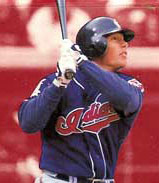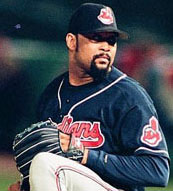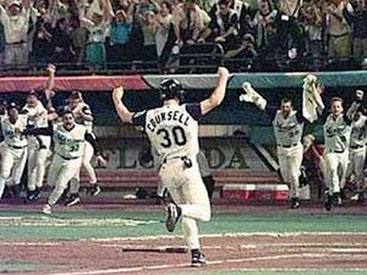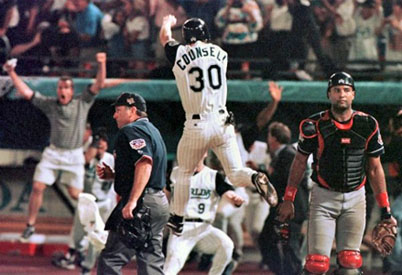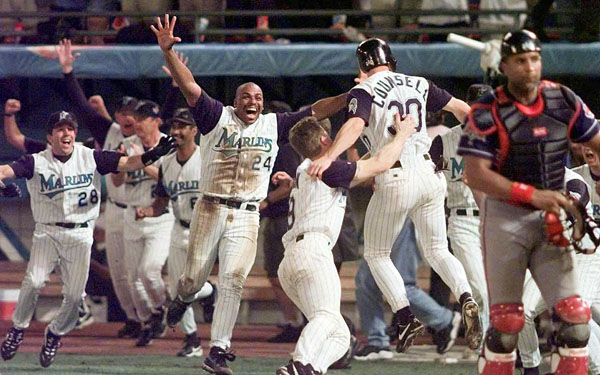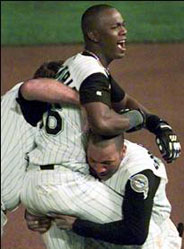1997 - Game 7: Cleveland Indians @ Miami Marlins
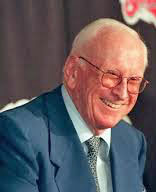
Dick Jacobs
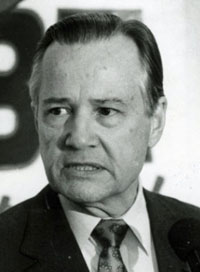
Hank Peters
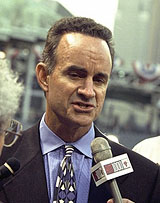
John Hart
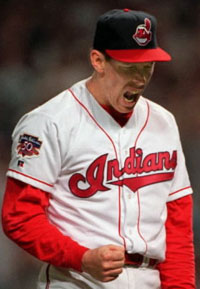
Orel Hershiser
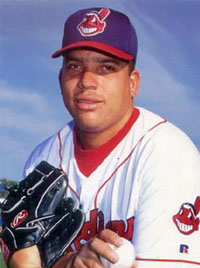
Bartolo Colon
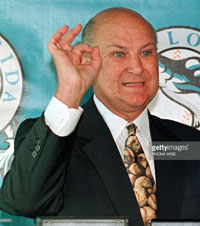
Wayne Huizenga
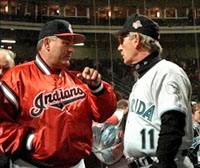
Mike Hargrove and Jim Leyland
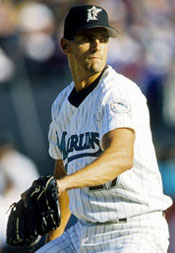
Kevin Brown
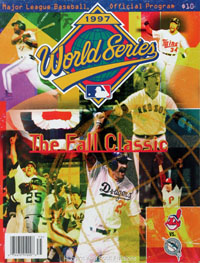
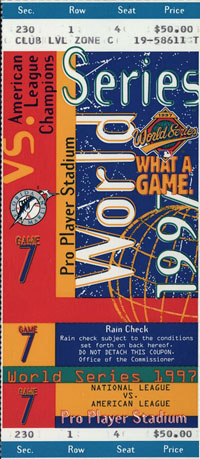
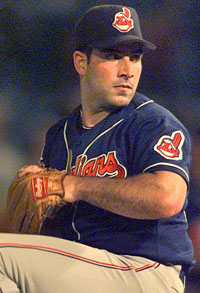
Chad Ogea
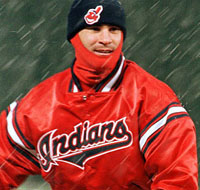
Omar Vizquel "warms" up before Game 4
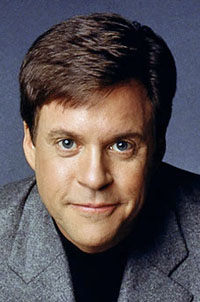
Bob Costas
|
The Cleveland Indians went from 1960 to 1994 - that's thirty-four years - without playing one meaningful game in the month of September, to quote longtime Cleveland writer Terry Pluto. But all that changed in 1994 after the club acquired a new owner, a new president, a new stadium, a new manager, and, last but not least, a new general manager.
- Dick Jacobs bought the franchise in 1987 and persuaded the city to finally build a new ballpark, which was christened Jacobs Field.
- Jacobs hired Hank Peters as the team's president. Peters slashed the major league payroll in order to spend more money on scouts and the farm system. He also traded Joe Carter for Sandy Alomar Jr. and Carlos Baerga - an acquisition of young talent instead of trading away promising players as the Indians had done for decades. Peters hired Mike Hargrove as manager and John Hart as GM.
- Hart traded Eddie Taubensee for Kenny Lofton and signed veteran P Dennis Martinez and Orel Hershiser, and 1B Eddie Murray. Hart quickly gained a reputation as one of the most astute GMs in baseball, and Hargrove became the Indians' best manager since Al Lopez, who led Cleveland to their last pennant in 1954.
- In 1994, Cleveland became a pennant contender for the first time since 1959. On August 10, the Tribe beat Toronto to pull within one game of the Chicago White Sox for the Central Division lead. The Indians were in a great position to earn at least a wild card spot in the expanded playoffs.
- The next day, baseball went on strike. The rest of the season as well as the postseason went down the drain.
August 10, 1994, held special significance for Indians fans. It was Rocky Colavito's 61st birthday. Rocky was a homer-hitting outfielder and fan favorite whom Cleveland GM Frank Lane traded to the Tigers for Harvey Kuehn at the beginning of the 1960 season. Superstitious Indians fans believed that the team's woes began with that trade. Writer Terry Pluto used the term "The Curse of Rocky Colavito" in the title of his 1994 book The Curse of Rocky Colavito: A Loving Look at a 33-Year Slump.
The '95 Indians finally ended the curse.
- With the same lineup as '94, the Tribe won the Central Division by a whopping 30 games, then swept the ALDS over the Red Sox. The Seattle Mariners, appearing in the post-season for the first time in franchise history, fell in six games.
- Thus did Cleveland enjoy its first World Series since 1954. Unfortunately, the Atlanta Braves - descendants of the 1948 Boston Braves, the team the Indians defeated in their last Fall Classic - prevailed in six games.
- The next season, Cleveland won 99 games to again cop the Central crown. However, Baltimore upset the Indians in the ALDS in four games.
Experiencing the new frustration of "close but no cigar," Cleveland fans wondered if '97 would be the year their heroes finally won the World Series.
The National League had an even more unlikely champion.
- The Florida Marlins entered the National League as an expansion franchise for the 1993 season under the ownership of Wayne Huizenga, who also owned the Miami Dolphins.
- Like most expansion franchises, the Marlins struggled their first three seasons, winning only 64, 51, and 67 games. But they improved to 80-82 in '96 despite firing manager Rene Lachemann at mid-year.
- Finally, with Jim Leyland as manager and Dave Dombrowski as GM, Florida improved to 92-70, good enough for the wild card spot in the playoffs. But unlike the Indians, the Marlins entered the league playoffs with the second most wins.
Florida finished in the middle of the pack in the NL in hitting.
- 3B Bobby Bonilla led the starters with a .297 BA while driving in 96 runs.
- That was second to Moises Alou's 115 RBIs on a .292 average. The former Expo also led the club with 23 HRs, two more than RF Gary Sheffield.
- The best of the "homegrown" Marlins was C Charles Johnson, an excellent backstop but only a .250/63/19 hitter.
- SS Edgar Renteria anchored the infield and team with 2B Luis Castillo to help Florida rank 3rd in the Senior Circuit in DPs.
As is often the case, the Marlins rode solid pitching to the World Series.
- Florida ranked fourth in the NL in ERA at 3.83. But they improved that mark to 3.26 in the two playoff series.
- Kevin Brown (16-8/2.69 during the season) gave up only one run in the Game One victory over San Francisco, then beat the Braves twice in the NLCS.
- But the surprise jolt came from rookie RHP Livan Hernandez (9-3/3.18), who was not even in the Marlins' rotation when the playoffs began. But he outpitched John Smoltz 5-2 in Game 3 and Greg Maddux 2-1 in Game 5 of the NLCS.
- Florida swept the Giants in the NLDS and upset the Braves, who had led the Marlins by 9 games in the East Division, in six games.
- So Leyland, who had led the moribund Pirates franchise to the NL East title each year from 1990 through 1992 only to be denied the pennant each year, finally made it to the World Series.
Leyland was a baseball lifer whose playing career consisted of seven years in the minors at the AA level and below. At age 25, he began coaching in the Tigers organization and two years later became the manager of their low-A farm team in Clinton IA. He served as Tony LaRussa's 3B coach from 1982-85, which led to his stint as Pirates skipper. Every manager savors his first World Series, but Jim enjoyed his even more since it had taken him 25 years to get there.
The Las Vegas oddsmakers pegged the Marlins as favorites, probably because of their superior pitching.
- Most of the time, the network televising the World Series roots for the classic to go the full seven games because the ratings are highest for the final games.
- But Don Ohlmeyer, president of NBC West Coast, admitted his network was looking for four and out. Either way, that's what we want. The faster it's over with, the better.
- Why would he say that? Because Cleveland and Miami-Fort Lauderdale were among the smaller major league markets. So NBC would rather have its regular prime-time schedule the second weekend of the Series.
Ohlmeyer's fears were well-founded. Ratings for the '97 Series hit an all-time low in the U.S. However, a record audience watched on TV in 205 countries, with 40 another million tuning in to the 365-station Latin Broadcasting Company radio network. In Colombia, an evening soccer match featuring a popular team was moved to 4 PM so as not to conflict with the World Series game.
- In any case, Bob Costas would do the TV play-by-play assisted by Joe Morgan and Bob Uecker with Jim Gray the field reporter.
- CBS broadcast the games on radio with Vin Scully joined by Jeff Torborg and John Rooney.
Series Results
- Saturday, October 18 @ Florida: Marlins 7 Indians 4
WP: Livan Hernandez; LP: Orel Hershiser
- Sunday, October 19 @ Florida: Indians 6 Marlins 1
WP: Chad Ogea; LP: Kevin Brown
- Tuesday, October 21 @ Cleveland: Marlins 14 Indians 11
WP: Dennis Cook; LP: Eric Plunk
- Wednesday, October 22 @ Cleveland: Indians 10 Marlins 3
WP: Jaret Wright; LP: Tony Saunders
- Thursday, October 23 @ Cleveland: Marlins 8 Indians 7
WP: Hernandez; LP: Hershiser
- Saturday, October 25 @ Florida: Indians 4 Marlins 1
WP: Ogea; LP: Brown
After losing Game 5, the Indians faced the daunting task of becoming the first team since the 1979 Pirates to win the last two games on the road to take the Series.
Each manager made a controversial choice for his Game 7 starter.
- Leyland went with erratic southpaw Al Leiter, 0-1 with a 6.35 ERA in the postseason. The 32-year-old veteran, in his eleventh year in the big leagues, had not been effective in Game 3, surrendering six hits, six walks, and seven runs in 4 2/3 innings. But he had put that outing behind him, laughing and joking with teammates. I'm always like this, he explained. The walks hurt last time, but I had a pretty good idea about what I wanted to do. It's a matter of executing. ... Baseball is meant to be fun through good or bad. I've played long enough to know you're going to have good games and bad games. I'm totally mentally and physically prepared to start.
Leyland: We had no question Al Leiter was the guy to start the final game (despite his poor performance in Game 3). He'd been outstanding for us, a veteran who already had been a World Series champion with Toronto. The only concern occasionally was his control, but his stuff was as good as anybody's. I felt very comfortable with it.
- Hargrove, celebrating his 48th birthday, decided to put 49 years of Cleveland failure into the hands of 22-year-old rookie Jaret Wright. Son of former big league P Clyde Wright, Jaret had been the Indians' most effective pitcher in the post-season. He beat the Yankees twice in the division series and got a no-decision in the ALCS against Baltimore. He allowed the Marlins just five hits in six innings in the Indians' 10-4 victory in Game 4 of the Series. He would be just the sixth rookie to start a World Series Game 7 and the first since Joe Magrane of the Cardinals in 1987.
When you dream, you don't dream of pitching in the playoffs, said Wright. You dream to pitch in Game 7 of the World Series.
Leyland: We were hoping maybe his youhth would make him jittery and cause mistakes. But for six innings, that didn't work out.
- Hargrove was asked when he chose Wright over Charles Nagy. Was it after he had Nagy warming up in the bullpen in the 6th inning of Game 6? Mike said he made the decision earlier that day, implying that's why he put Nagy in the bullpen for Game 6.
Hargrove based his reluctance to use Nagy on the righthander's recent struggles. Cleveland's ace had fallen behind batters and looked tentative throughout the playoffs. Mike also considered Wright confident but not cocky.
Nagy: When we won Game 6, they called me into the office and told me that they were going to make a switch and Jaret was going to pitch Game 7. I was disappointed at first. That's what you live for. I was lined up to pitch that game. I was prepared for it. But then, all of a sudden, you have to change gears. You can't feel sorry for yourself, you have to do what's best for the team. I was going into the bullpen.
Hargrove: It maybe was the hardest decision I ever had to make. Charlie is one of my all-time favorite players that I managed. But I also knew that Charlie would understand my decision, and he wouldn't go off in a corner and sulk.
- If the pattern of the teams alternating victories continued, the Marlins would win. Also, the Indians hoped to break the streak of five straight home teams winning the 7th game of a World Series and give their skipper a great present on his 48th birthday.
The night before the final game, Cleveland GM John Hart couldn't sleep.
- At 3 AM, he got up and walked onto his deck at the Fontainebleau Hotel overlooking the Atlantic Ocean. In the quiet of the night, he made peace with whatever the results would be in Game 7.
- Like many players, John recalled playing baseball in his backyard as a boy, dreaming of being in Game 7. Now here he was. He had done all he could to get the Indians to this point.
Excited Marlins fans started tailgating in the Pro Player Stadium parking lot at 1 PM.
Jim Leyland held a brief team meeting in the Marlins locker room before the game.
- He had spoken to his team before every game of the Series, often invoking the name of Muhammad Ali. Leyland, in a throaty voice made scratchy by too many cigarettes and too much coffee over the 3,721 pro games it took him to get to the World Series, made this promise to his team before Game 7: "When you come back here, you will be world champions." (Tom Verducci in Sports Illustrated)
- When Jim left, Gary Sheffield stood up and, after leading a prayer, asked the team to dedicate the game to their manager, who had spent 33 years in baseball without wearing the ultimate crown.
|
Cleveland Lineup
| Omar Vizquel |
SS |
| Tony Fernandez |
2B |
| Manny Ramirez |
RF |
| David Justice |
LF |
| Matt Williams |
3B |
| Sandy Alomar |
C |
| Jim Thome |
1B |
| Marquis Grissom |
CF |
| Jaret Wright |
P |
|
 |
 |
Florida Lineup
| Devon White |
CF |
| Edgar Renteria |
SS |
| Gary Sheffield |
RF |
| Darren Daulton |
1B |
| Moises Alou |
LF |
| Bobby Bonilla |
3B |
| Charles Johnson |
C |
| Craig Counsell |
2B |
| Al Leiter |
P |
|
|
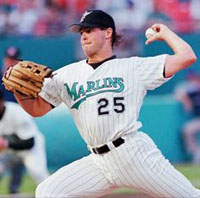
Al Leiter
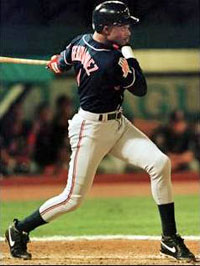
Tony Fernandez
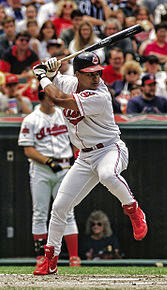
Manny Ramirez
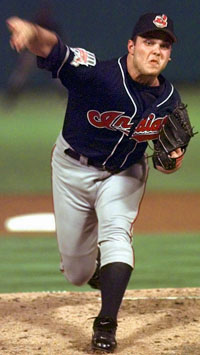
Jaret Wright
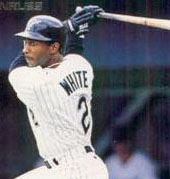
Devon White
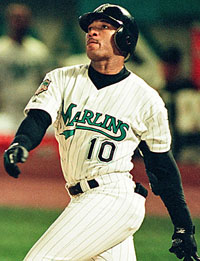
Gary Sheffield
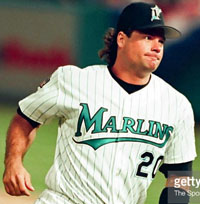
Darren Daulton
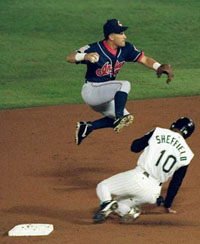
Sheffield's illegal slide
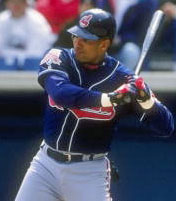
David Justice
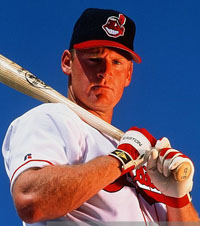
Matt Williams
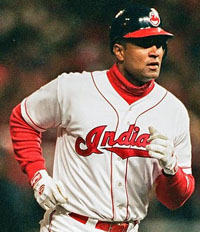
Sandy Alomar
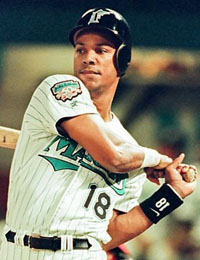
Moises Alou
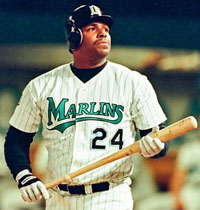
Bobby Bonilla
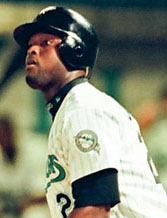
Charles Johnson
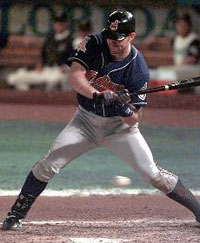
Jim Thome
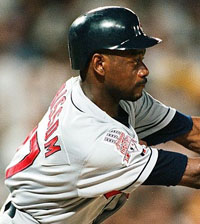
Marquis Grissom
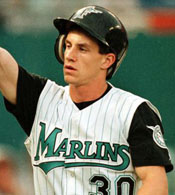
Craig Counsell
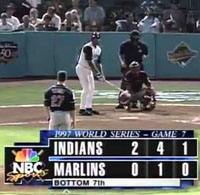
Wright prepares to throw the first pitch to Bonilla, who swats it over the RF fence
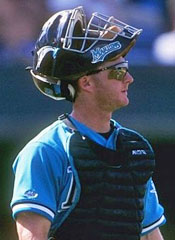
Gregg Zaun
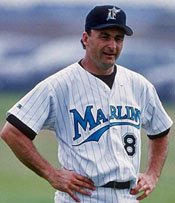
Jim Eisenreich
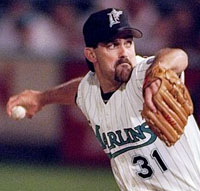
Robb Nen
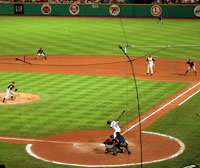
Counsell drives tying sacrifice fly.
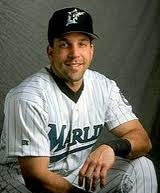
John Cangelosi
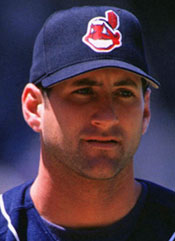
Charles Nagy
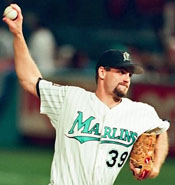
Jay Powell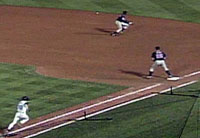
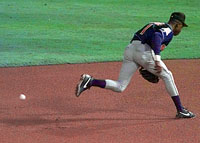
Two views of Fernandez error
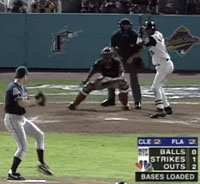
Nagy pitches to Renteria.
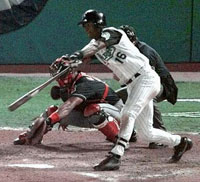
Renteria pokes winning hit.
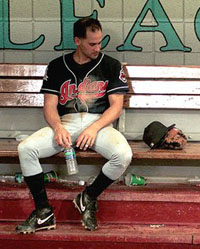
Vizquel alone in dugout after game.
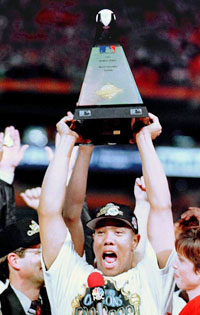
Livan Hernandez hoists MVP trophy
|
67,204 gathered in Pro Player Stadium on a muggy South Florida night - 80°, 88% humidity.
1st inning
2nd inning
- LF David Justice broke his bat on a grounder to Daulton who made the putout unassisted.
Justice had played in the 1995 World Series for the Atlanta Braves against the Indians.
3B Matt Williams had started hitting the last few games of the Series. He struck out on a low slider on the 3-2 delivery.
Leiter, who didn't have a single 1-2-3 inning in his Game 4 start, got his second in a row when C Sandy Alomar flied to CF.
- Wright jumped ahead of Moises Alou 0-2. The Marlins LF popped to 2B Fernandez in short RF.
Alou would become famous for his temper tantrum playing for the Cubs against the Marlins in the 2003 NLCS when a fan named Steve Bartman prevented Moises from catching a foul fly in the 8th inning.
Bonilla's .167 Series average caused Leyland to drop him from 4th to 6th. He continued his habit of swinging at pitches out of the strike zone by pulling an outside fastball for a 4-3 out.
Bonilla played in the Series on a gimpy leg caused by a strained left hamstring. However, he adamantly refused to be a DH for the games in Cleveland.
When Wright caught C Charles Johnson looking at a curveball, the Series had its first game that was scoreless after two innings.
3rd inning
- Leiter missed on a 3-2 fastball to make Jim Thome the Indians' first baserunner.
Trying to pound CF Marquis Grissom (.381)
inside with fastball, Al threw three straight balls before fighting back to run the count full. But Grissom lined a single between SS and 3B.
Like Justice, Grissom had played for Atlanta against Cleveland in the 1995 Fall Classic.
With runners on 1st and 2nd, everyone expected Wright to bunt. With the count 3-2, he laid one hard down the 1st base line. Daulton fielded it cleanly and wanted to go to 3rd but couldn't get the ball out of his glove. So he turned and threw to 2B Craig Counsell covering first.
Vizquel popped a 2-0 fastball to Renteria in short LF. The runners had to hold.
Fernandez bailed out his SS by lining a 2-1 fastball into CF to plate both runners.
Tony had won the pennant for the Indians with his HR in the top of the 11th for the only run of Game 6 against the Orioles. Would this two-run single also be the winner in the World Series?
Pitching coach Larry Rothschild came out to talk to Leiter. In the meantime, two hurlers started throwing in the Marlins pen: LHP Felix Heredia and RHP Antonio Alfonseca.
Laboring now and throwing hard stuff almost exclusively, Leiter walked Ramirez on four pitches.
Al threw a sharp curve that Justice fouled off to fall into an 0-2 hole. Two pitches later, Dave couldn't hold up on an outside fastball.
Indians 2 Marlins 0
- Counsell (.211 in the Series after hitting over .300 in the two AL series) hit a soft fly into RCF that Grissom easily ran down.
Leiter made Wright throw seven pitches to walk him on a full count.
White also made the P work, fouling off four pitches, before fanning on a high hard one.
Renteria prolonged the inning with a five-pitch base on balls.
Wiggling his bat behind his head, Sheffield swung hard on an 0-1 pitch and popped to 3B.
4th inning
- Leiter struck out Williams on a low-breaking curve.
Alomar lined the first pitch, a high fast ball, down the LF line. Alou hustled over and held the big C to a single.
Continuing to throw good breaking balls, Leiter got Thome to hit a fly to RCF. Sheffield took a step back, then ran in hard to make a running catch around his knees.
Grissom fouled off ball four on a high 3-2 fastball, then swung through a curve.
- Continuing to run up his pitch count, Wright got a 4-3 groundout from Daulton on a 3-2 pitch.
Alou looked at strikes two and three, the first a fast ball on the outside corner, the second a curve that caught the inside corner.
The next hitter, Bonilla, also questioned Ed Montegut's strike zone
before he whiffed.
5th inning
- Wright fanned on three pitches.
Vizquel flared the 3-2 pitch just beyond the reach of Renteria down the LF line for a single.
After apparently missing a hit-and-run sign on the first pitch to Fernandez, Omar stole second on the next pitch. He stayed there as Tony struck out swinging.
The Marlins walked Ramirez intentionally to put runners on 1st and 2nd with two down.
On the 2-2 pitch, Vizquel took off for 3rd and made it easily. But with Ramirez running on the 3-2 pitch, Leiter painted the outside corner with a curve to escape the jam.
- Johnson tried to pull a two-seam fastball but chopped it in front of the plate. Wright hurried in and threw him out.
Counsell took a fastball on the inside corner for strike three.
With two out and no one on, Leiter hit for himself. He never swung the bat, walking on five pitches.
Both bullpens got busy.
Dennis Cook, a former Indian, for Florida and another lefty, Brian Anderson, for Cleveland as
pitching coach Mark Wiley made his way to the mound.
White hit the first pitch all the way to the edge of the warning track in CF where Grissom gathered it in.
6th inning
-
Williams walked.
Alomar fouled to Daulton midway down the 1B line.
Thome bounced straight to Daulton, who started a 3-6-3 double play.
- Renteria, with the only Florida hit - a double in the 1st, lined to Grissom.
Several close calls went against the P to make it 3-2 before Sheffield, still swinging hard, whiffed on an inside high fastball.
A pitch after hitting the dirt to avoid a fastball at his head, Daulton hit a low liner to RF that Ramirez seemed to lose in the light as he went down to catch. The ball went off his glove to the wall. Daulton raced to 3rd as Grissom retrieved the three-base error.
But on the first pitch, Alou reached for a curve and flew to CF.
7th inning
- 35-year-old journeyman Cook took the mound and dispatched the Indians in order.
Leyland: Our bullpen was flawless. Cook didn't give up a run the entire Series. We had a couple of young guys in Heredia and Alfonseca who both had huge arms, but who probably wouldn't have pitched had the game not turned out the way it did. But we also were sitting there with Robbie Nen and Jay Powell, so our bullpen was pretty well stacked, and I felt comfortable with anybody I went to.
Grissom sent Sheffield to the warning track in RF to catch his liner.
Surprisingly, Wright hit for himself. Few fans gave him an ovation until he took a called third strike.
Vizquel went down swinging.
- The fans had barely sat down after the 7th inning stretch when Bonilla cracked Wright's first pitch, a hanging changeup, into the RF stands to cut the lead in half. Now the second guessers were really questioning Hargrove's decision not to pinch hit for the P in the top of the inning.
As Bobby waited for Wright to warm up, the garrulous 3B spoke to former Brooklyn Dodger P Joe Black, who was sitting in the first row behind the screen. Asked afterward what they talked about, Bonilla replied, He asked me if I was standing too close to the plate, and I said, "You know what? I am."
Wright on Bonilla: He's a big strong guy with quick hands. He got all of it, and he hit it out. That's about it.
Lefty Paul Assenmacher and righty Charles Nagy began throwing hard for Cleveland.
If Wright was shaken by the homer, he didn't show it as he poured a fastball past Johnson for his seventh strikeout.
But then the young hurler walked Counsell on four pitches.
Leyland sent up lefthanded Cliff Floyd to bat with Cook. Then Hargrove removed Wright in favor of his southpaw Assenmacher.
When Wright left, he still had a chance to become the first rookie to win Game 7 of the World Series since Babe Adams of the Pirates.
So Floyd left before getting a chance to swing in favor of righthanded Kurt Abbott, who skied to Ramirez.
Using his excellent curve, Assenmacher fanned White.
Indians 2 Marlins 1
8th inning
9th inning
- Williams drew a walk off Alfonseca.
Alomar hit a bouncer to Renteria, who ran in but juggled the ball before tossing to Counsell for the force.
With Thome up next, Leyland called on Heredia, the slender, hard-throwing lefty.
Thome greeted him with a single between 1st and 2nd. Alomar chugged all the way to 3rd with only one out.
Leyland made a double-switch: 38-year-old Jim Eisenreich at 1B batting 9th and Robb Nen pitching and batting 4th.
Nen, the Marlins' closer, had a good season (35 saves) but had been cuffed around by the Indians in the Series. But, needing a strikeout with the insurance run on 3rd, Leyland called on his fireballer. Nen was a lights-out closer that season, and he was throwing the ball so hard that night it was unbelievable.
The infield played in halfway, ready to turn two if Grissom hits a potential DP grounder right at an infielder. If you have to charge the ball, go home if Alomar breaks off 3rd.
Marquis bounced to Renteria who again had trouble getting the ball out of his glove but still had time to throw to C Johnson, who tagged Alomar who came in standing up.
Afterward, Alomar admitted he was shocked by Renteria throwing home instead of going for the double play. I was a dead dog.
Leyland: Renteria made a really good play, and Charles Johnson made a good pick in the dirt to get a tag out at the plate.
Brian Giles, a lefthanded batter, hit for Anderson and flied to Alou.
Plastic tarps were being hung in the Cleveland locker room in preparation for the champagne-spewing postgame celebration. An NBC crew began setting up a wooden platform draped with red, white, and blue bunting to interview the victors. The name CHAD OGEA was being engraved on the MVP trophy.
- Hargrove put the hopes of beleaguered Indians fans on the back of his closer, Jose Mesa, who had saved Game 6.
Born in the Dominican Republic, Mesa signed with Toronto at age 15. After six years in the Blue Jays system, he was traded to Baltimore. He continued to struggle as a starter until he was dealt to the Indians, who put him in their rotation in '92 and '93. Finally, Cleveland moved him to the bullpen, where he saved 46 games in '95 and 37 (without a blown save) in '96. But distracted by a rape charge for which he was finally acquitted as the next season began, he recorded only 16 saves in '97.
In his autobiography, Vizquel wrote about the meeting at the mound as Mesa entered Game 7. The eyes of the world were focused on every move we made. Unfortunately, Jose's own eyes were vacant. Completely empty. Nobody home. You could almost see right through him.
First up was Alou.
Low curve. Ball one.
Swing and miss a low curve. 1-1
Liner over SS on another low curve for a single - just the Marlins' third hit of the night.
In Cleveland, called the "insecurity capital of the country" by a young Sports Illustrated writer named Tom Verducci, Indian fans quaked with dread.
Do you have Bonilla, who homered his last time up, sacrifice the tying run to 2nd? No, decided Leyland.
Foul.
Swing and miss.
Low fastball. 1-2
Overhand curve in dirt, blocked by Alomar to keep Alou at 1st. 2-2
High. 3-2.
Does Leyland send the runner or play it safe?
Not going. Breaking ball. Line drive just foul down RF line.
Fouled off his foot.
Swing over a sinking fastball. One out.
Johnson steps in.
Ball one.
Fastball on outside corner.
1-1
Foul. 1-2
Line drive that drops in front of Ramirez in RF as Alou streaks to 3rd.
Backup C Gregg Zaun, a better runner, replaces Johnson at 1B.
Nagy gets up again in the bullpen.
Leyland: We had to do a lot of thinking in that game. I made a move there, having Gregg Zaun run for Johnson, knowing I wasn't going to have another catcher. I said to myself, I can't let Johnson run because Zaun might be able to get down to second to break up a double play, whereas Charles wouldn't.
The rookie from Notre Dame, Craig Counsell, steps in. Cleveland plays its middle infielders at DP depth, corners in.
Ball low.
Fouled into the dirt down 3B line. 1-1
Line drive to RF. Ramirez runs back and snags it but Alou scores easily as the crowd goes berserk. Tie game!
Counsell: I took the first pitch, fouled off the second pitch and hit a ball really good to RF. Manny Ramirez made a nice play. I think the crowd was going crazy. They should have been.
Leyland: Getting Counsell from Colorado(in a July deadline deal) was a great scouting job by our guys, including Dick Egan. There was nothing fancy about Counsell; he was just a good, steady player who was great under pressure. ... Actually, instead of the sac fly, Counsell could easily have had a game-winning hit right there. They had been trying to move Manny Ramirez more to right-center for Counsell, but whether he didn't see them or what, he did not get over. He'd gone toward the line for Charles Johnson's ball and just kind of stayed there. Had he moved more to right-center for Counsell, he probably wouldn't have caught that ball, Zaun probably could have scored from first, and we'd have been world champions right there.
Eisenreich takes low. Ball one.
Bouncer to Fernandez, who tosses to 1st.
Indians 2 Marlins 2
The tarps came down in the Cleveland locker room and CHAD OGEA's name was removed from the MVP trophy.
Hargrove: As a manager, all you can do is put people in positions where their talent can dominate. And put them in good positions where they can do their jobs. We felt like we had the people where they needed to be. We felt like Jose Mesa gave us the best chance to win. It just didn't happen. That's just the game.
Nagy: I was in the bullpen. We had one out in the ninth inning, and everybody was hyped-up because we are two outs away from winning the World Series. We didn't know what was going to happen. We were getting ready to jump on the field and celebrate, and then all of a sudden things took a turn. The next thing you know, you have to grab your glove, and everyone starts warming up again.
10th inning
11th inning
- In what is now the second longest Game 7 in history (1924 - 12 innings), Jay Powell, a righty, becomes Florida's sixth P.
Looking for his first hit of the evening, Williams instead draws his third walk.
Does Hargrove call for a bunt or pull a hit-and-run or none of the above?
Alomar bunts in front of the plate. Powell grabs it and fires to Renteria for the force
at 2nd.
Thome ends the mild threat by rapping into a 4-6-3 DP.
- Nagy faces the 6-7-8 hitters in the Florida lineup.
After again talking to Joe Black while waiting to hit, Bonilla whistles an 0-2 pitch up the middle for a single.
Batting for the first time, Zaun bunts foul, then pops another attempt behind the plate. Trying again on 0-2, he pops it to Nagy who has to wait for Fernandez to come over from 2B to cover 1st, allowing Bonilla to just beat the throw to 1st.
Counsell, whose SF drove in the tying run in the 9th, has another chance to be the hero. He fights off several 0-2 pitches before hitting a weak grounder between 1st and 2nd. Fernandez goes over to field it as Bonilla holds up to let the ball go in front of him. Thinking about whirling to get the lead runner at 2nd, Tony takes his eye off the ball, which hits the bottom of his glove and roll into RF. Bobby ends up on 3rd. The man who looked like the evening's hero may now become the goat.
Eisenreich receives an intentional pass to set up a forceout at home. With the infield drawn in, White hits the first pitch to Fernandez's left. Tony gets a big hop this time and throws to Alomar for the force at home.
Leyland: Between pitches, I couldn't help but keep looking down at my lineup card. Alex Arias was the only guy I had left on the bench, and if things keep going, I'm probably going to have to pitch Livan Hernandez. ... Here we are, bases loaded, one out. Just hit a sacrifice fly! The outfield's in. Just hit a fly to center or right. They'd have to go back on it, and even if they catch it, they can't throw anybody out. We'd win the World Series. Well, on the first pitch, Devon White got jammed by a breaking ball and hit a ground ball to Fernandez, who threw it home for the force. Now, as Renteria comes to bat, I can't stop looking at my lineup card thinking about more moves.
Renteria bats with two outs. At that point, the Marlins were in an 0-for-16 slump with runners in scoring position dating back to Game 6. However, Edgar had ended ballgames seven times that season. Could he do it again?
Counsell: The big thing was, Edgar had been so great in those situations ... There was no guy that anybody on the team wanted up more than him. He was just the guy you wanted up at the plate. ... On 3B I had an easy job. I didn't have to be risky. I didn't have to make a great decision. It was just touch home plate.
Curve over for strike one.
Nagy tries his famous sinker, but Edgar reaches down and flicks a liner just over Nagy's glove into CF for a single to win the World Series! Renteria raises his arms as the ball lands on the outfield grass. When Counsell touches home plate at 12:06 AM local time, he leaps high into the air, coming down in a mob of teammates.
It was the 27th time the Marlins won in their final AB during the 1997 season, including two times in the NLDS. And Renteria had down provided eight of the game-winning hits.
Nagy: I got ahead strike one. The second ball he kind of didn't hit it all that well. It was just one of those that kind of knuckles to you, and it tipped off the top of my glove.
Leyland: On the first pitch, Nagy throws Renteria a breaking ball. Edgar jumps back like it totally fooled him. On the next pitch, he throws a breaking ball down and away, actually low and outside off the plate, for a ball, really - actually a better pitch than the first one. Except Renteria dives in and strokes it to CF. Suddenly, it's all over and I don't have to worry about anything else. To this day - and whenever I ask Edgar about it, he gives me a big smile - I think Renteria set him up on the first pitch to get another breaking ball on the second pitch. Suddenly it's over. It's hard to explain. You just react. I pointed to (wife) Katie and (six-year old son) Patrick in the stands. ... I ran around the field, borrowing the (world championship) flag. I was a smoker, and I was so out of breath that I had to slow down and tap my chest. He took a victory lap around the stadium, waving and smiling and pumping his fists. Numerous players hugged their beloved skipper.
It was the second time in three years that the last ball of the World Series ended up in the glove of CF Grissom. Two years earlier, as a Brave, he made the final putout when he caught Carlos Baerga's fly ball. He threw the ball into the air in jubilation. This time, he picked up Renteria's hit and carried it in the pocket of his glove as he ran off the field. Just before going down the dugout stairs, he looked back at the Marlins' celebration. He tossed the ball toward the middle of the diamond, where it rolled among the feet of world champions too busy to notice the intruder.
Hargrove: One of my best friends ever is Rich Donnelly. He was the 3B coach with the Marlins. And I always had a lot of respect and a good friendship with Jim Leyland. I remember when Counsell scored, I looked at Rich first and then at Jimmy. I saw them celebrating, and I said, "OK, that's enough." I didn't stay out there. I didn't want to sit there and suffer publicly
MARLINS 3 INDIANS 2
|
Livan Hernandez, who beat Hershiser twice, was voted Series MVP, making him just the second rookie to win the award. He was also the first rookie in 50 years to win two World Series games.
Livan had already received a gift that undoubtedly meant more to him than any trophy. After weeks of negotiations, the Cuban government finally allowed his mother to travel to the U.S. Unfortunately, she didn't arrive in time to see her son pitch but did meet him before Game 7.
Postgame
Marlins Clubhouse
- Leyland: I guess every little boy imagines this might happen at one time. It's a total fantasy for me. I was a little concerned. We haven't given up all year. Tonight wasn't the time to give up. When we walked into the clubhouse tonight, we knew we were going to be world champions.
- Counsell on Renteria: He's done it so many times this year, and he did again. He's a big money player.
- Renteria: This is the greatest thing in life. I want to share this with all the people in Colombia and the fans in Miami.
- Sheffield: We had a great attitude. We kept coming back all year.
- Rothschild: Around the seventh inning, I started to think it was going to be a classic, maybe go to extra innings. The tension was there with every pitch. When you get to the seventh game of a World Series, whatever people have said about it before doesn't mean anything.
Indians Clubhouse
- Hargrove: I'm very disappointed that we lost. I can't describe how disappointed. I don't really know what to tell the team, other than they played hard all year long. We overcame long odds to get where we're at. We played hard, we didn't give the game away. It could've gone either way. It just happened to go the Marlins' way. Speaking about his players, he continued, I feel for them, feel the loss. But don't feel bad about who they are or where they've come from or where they've gone. They should feel proud of themselves, because they were champions. They were winners.
For an ESPN.com article on the '97 team as the 2016 World Series started, Hargrove recalled: I had a person ask me the next year in spring training how long did it take me to get over losing Game 7? And I said, "Just as soon as it happens, I'll let you know." I had a person ask me about two months ago, "How long did it take you to get over that?" And I said, "You know what? Just as soon as it happens I'll let you know." It's something that never goes away, but you certainly value the experience and the chance to go to a World Series. Very few people get the chance to go.
- Fernandez refused to blame Bonilla for screening him on his crucial error and also said the ball did not take a bad hop. It's a play that I should make. It's a play that any second baseman should make. If the Lord allowed this to happen, then it happened for a reason. He knows that I can handle it. ... It's still painful. I now something good is going to come out of this. I don't want to use any excuses. It happens. ... I'm prepared for anything in life. I've been at my highest point. I've been at my lowest point. It's something that we all have to live with. I would not be dealing with this if there was not a reason. ... I'll have a lot of players I'll replay in my mind. Like anything else in life, this too shall pass. I'm thankful to God for the opportunity to play.
Of all Indians who had double-digit ABs in the 1997 World Series, Tony Fernandez had the highest batting average: .471 (8-for-17). But that fact has been obscured in baseball fans' memories by the error he made in the 11th inning of Game 7.
- The buzz in the clubhouse was about the performance of Wright. My performance is separate, he said. It's a team. We go out there together. Next year, there'll be a fire to go out there and celebrate like the Marlins did tonight. All you can do now is wait.
- Nagy on the winning hit: I thought I made a good pitch, and Renteria just hit it up the middle. ... We were so close.
- Vizquel: I wanted to know what the feeling was like on the other side. ... No question, this is tougher than losing to the Braves in '95. We were so close. We were one inning away. A lot goes through your mind. You start thinking about hopefully celebrating and about your teammates and friends. Then it all gets taken away. ... What's so hard is that we were one pitch, one batter, however you want to put it, from winning. We were so close. It's just so hard to describe.
GM John Hart recalled: When we got beat, the players came in [to the clubhouse] and there were a lot of tears ... You're devastated. To have the team that was probably the least talented team in that run we had in Cleveland, as far as the numbers and all the personnel ... But we still had a really good team. ... To get that close and have it snatched away was a heartbreaker. But God, there were just so many great things we did.
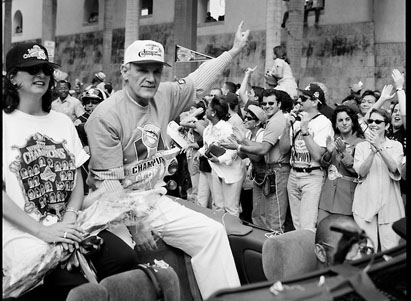
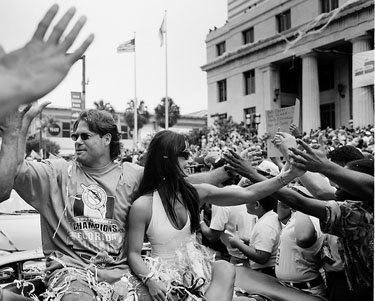
Miami celebrates Marlins' championship.
Leyland: What a wild ride. The parade afterward - a two-fold parade - was the most amazing thing I've seen in my life. We had a parade through Little Havana, then a water parade where each player and his wife were on a boat as we went through all the waterways and channels, with people looking on from bridges and out of the yards in their home. A cannon went off every time we went under a bridge. After all this, we end up at Pro Player Stadium with 72,000 packed in - plus people outside who couldn't even get in - to greet us. At the stadium the great Gloria Estefan sang a song she'd written. It was unbelievable.
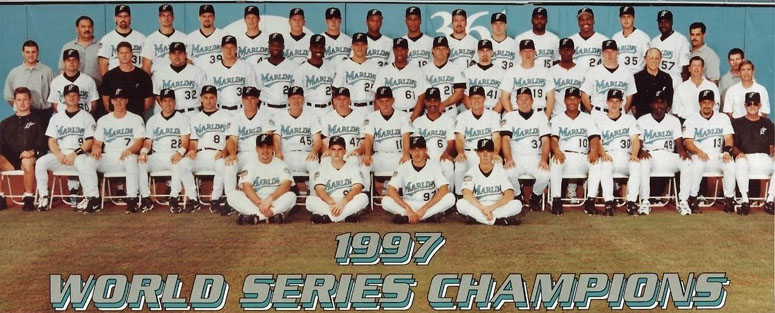
Just a year later, Florida finished 54-108 because owner Wayne Huizenga, intent on selling the club after claiming he lost $34 million in the championship year, sold all his key players. Leyland left the Marlins in 1999 to manage Colorado.
References: "Happy Ending," Tom Verducci, Sports Illustrated 11/3/97
Our Tribe: A Baseball Memoir, Terry Pluto (1999)
The Seventh Game, Barry Levenson (2004)
"The Game I'll Never Forget," Jim Leyland as told to Bruce Levine and Joel Bierig,
Baseball Digest January/February 2019
Next in this series: 2001 Yankees @ Diamondbacks
|
|

















































